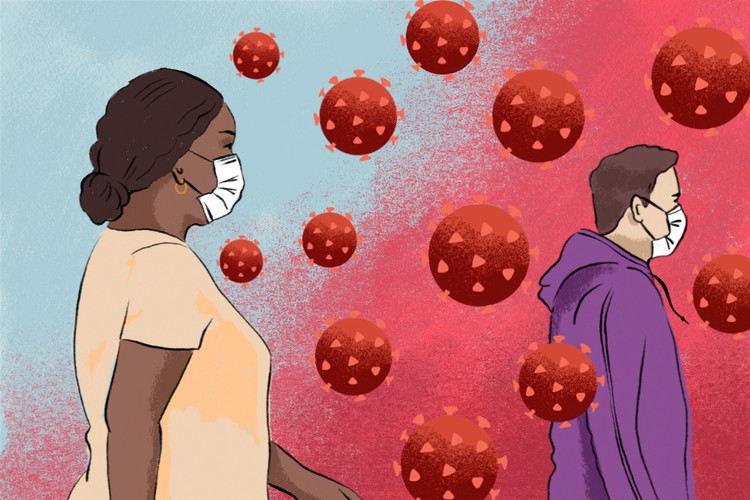
26 January 2022
Illustration: Lisa Nelson
Covid has changed. The virus is now much more transmissible, and Omicron dominates in most countries with a steep rise in cases. This virus is with us for the long term, so how should we deal with it?
Fortunately, high infection levels and vaccination — nearly half of adults in SA have received at least one vaccination dose — have led to high levels of protective immunity and reduced hospitalisations and deaths.
But “living with the virus” may mean regular epidemics, perhaps seasonal (coinciding with when people are indoors the most). We may see mortality similar to, or worse than, flu, which kills at least 10,000 people in South Africa and several hundred thousand globally each year.
So what should we do? It’s time to end the national state of disaster. I agree with the call by Professor Francois Venter and colleagues. Our current approach in South Africa to the Covid pandemic has in many ways become irrational and ineffective. Instead, we should focus on things that work.
We can suppress future epidemic waves of Covid with better ventilation of indoor spaces and public transport, which will also reduce other public health threats like tuberculosis. And, especially, we can improve vaccination processes.
Vaccination reduces transmission by shortening illness duration and reducing viral load, but its major benefit is in greatly reducing severe illness and death, and possibly chronic illness (“long Covid”) too.
Our low vaccination rate cannot be entirely attributed to failed delivery systems. By reducing vaccine hesitancy — which is a problem not only for suppressing Covid but for stopping other common, vaccine-preventable illnesses — we can get the vaccination rate up.
Children mostly do okay when infected with SARS-CoV-2, the cause of Covid-19. This is because their immune systems are primed to deal with new viruses, with support from the many safe and effective vaccines we provide at this stage of life.
By adulthood, our immune systems have therefore been exposed, through infection and vaccination, to a wide range of common pathogens. This “training” by means of vaccination means we’re able to deal with the huge potential range of infectious threats, more or less successfully, which has saved millions of lives.
Unfortunately though, over a lifetime, our immune system’s capacity to deal with both old and new threats wanes.
In the case of SARS-CoV-2, adults need a vaccine to teach our immune systems what to do. Children, though better equipped immunologically to deal with the virus, benefit too, as they do from other vaccines. Covid infections also train our immune systems, but in becoming infected we take the unnecessary risk of severe illness, death, or chronic illness.
Repeated vaccine doses (probably at least three) may be needed to educate the immune system, nudging it along, just as with other vaccines, such as those for whooping cough (five doses) or polio (four).
Even if you have had Covid, and recovered from it, the vaccine provides additional, valuable immune system training.
At the same time, the new virus is adapting to its human host (as new variants evolve). It’s not a surprise that this is happening, and quickly. The consequence however is that vaccine efficacy is changing. This does not imply that vaccines are failing: on the contrary, we are quite lucky that the original vaccines still work so well to prevent severe illness.
The bottom line is: get vaccinated (which may mean three doses, and annual updates, like for flu); wear a well-fitted mask indoors if or when case numbers are high; and ventilate indoor occupied spaces for better long term public health.
These few targeted interventions, communicated clearly to the public, will help usher the pandemic out the door so we can resume focus on all our other important health problems, and be better prepared for any future resurgence and/or the next pandemic.